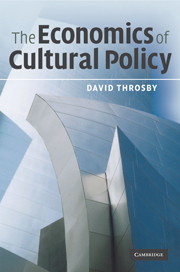Book contents
- Frontmatter
- Contents
- Preface
- Acknowledgments
- Abbreviations
- 1 Introduction
- 2 The scope of cultural policy
- 3 The policy process
- 4 Arts policy
- 5 Cultural industries
- 6 Cultural heritage
- 7 Culture in urban and regional development
- 8 Tourism
- 9 Culture in the international economy
- 10 Cultural diversity
- 11 Arts education
- 12 Culture in economic development
- 13 Intellectual property
- 14 Cultural statistics
- 15 Conclusions
- References
- Name index
- Subject index
15 - Conclusions
Published online by Cambridge University Press: 05 June 2012
- Frontmatter
- Contents
- Preface
- Acknowledgments
- Abbreviations
- 1 Introduction
- 2 The scope of cultural policy
- 3 The policy process
- 4 Arts policy
- 5 Cultural industries
- 6 Cultural heritage
- 7 Culture in urban and regional development
- 8 Tourism
- 9 Culture in the international economy
- 10 Cultural diversity
- 11 Arts education
- 12 Culture in economic development
- 13 Intellectual property
- 14 Cultural statistics
- 15 Conclusions
- References
- Name index
- Subject index
Summary
And in the streets: the children screamed
The lovers cried, and the poets dreamed.
But not a word was spoken;
The church bells all were broken.
And the three men I admire most:
The father, son, and the holy ghost
They caught the last train for the coast
The day the music died.
(Don McLean, ‘American Pie’, 1971)In 1999 Larry Rothfield published a paper whose title needs to be spoken aloud rather than read. ‘Cultural policy studies?’ he asked, repeating the question three times, each time with a different word emphasised. Can there be policy studies about culture? Can studies of culture have any relevance to policy? And finally, accepting that there is such an animal as cultural policy, what is there about it that can be studied? The last of these questions is the relevant one for our purposes here. That cultural policy exists is clear enough; we defined its scope and coverage in Chapter 1. But how the analysis of cultural policy is to be approached, and what sort of advice for policy-makers might flow from cultural policy studies, remains a contested issue.
If ‘cultural policy studies’ exists at all as an identifiable area for scholarly research and empirical analysis, one of its principal points of origin can be traced to the cultural studies discipline, a loose assembly of scholars and writers concerned with the fundamental nature of culture and how it evolves as a sphere of influence for the state.
- Type
- Chapter
- Information
- The Economics of Cultural Policy , pp. 231 - 236Publisher: Cambridge University PressPrint publication year: 2010



